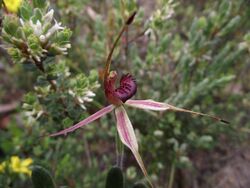Biology:Caladenia ampla
| Dainty spider orchid | |
|---|---|

| |
| Scientific classification | |
| Kingdom: | Plantae |
| Clade: | Tracheophytes |
| Clade: | Angiosperms |
| Clade: | Monocots |
| Order: | Asparagales |
| Family: | Orchidaceae |
| Subfamily: | Orchidoideae |
| Tribe: | Diurideae |
| Genus: | Caladenia |
| Species: | C. ampla
|
| Binomial name | |
| Caladenia ampla | |
| Synonyms[1] | |
| |
Caladenia ampla, commonly known as the dainty spider orchid,[2] is a plant in the orchid family Orchidaceae and is endemic to Victoria. It is a ground orchid with a single hairy leaf and a single flower which is sometimes yellowish-green flower with red stripes and sometimes entirely red.
Description
Caladenia ampla is a terrestrial, perennial, deciduous, herb with an underground tuber and a single hairy leaf, 6–10 cm (2–4 in) long and 5–7 mm (0.2–0.3 in) wide.[3]
A single flower (rarely two) is borne on a spike up to 22 cm (9 in) high. The dorsal sepal is erect, oblong to lance-shaped, 30–37 mm (1.2–1.5 in) long and about 3 mm (0.1 in) wide. It tapers near the end which terminates in a glandular structure 6.5–9 mm (0.3–0.4 in) long. The lateral sepals are oblong to lance-shaped, 30–37 mm (1.2–1.5 in) long, 4–5 mm (0.16–0.20 in) wide and end in a gland similar to the one on the dorsal sepal. The petals are 28–32 mm (1.1–1.3 in) long, 2–3 mm (0.08–0.1 in) wide and taper to a point. The labellum is a broad egg-shape, curves forward, 14–16 mm (0.55–0.63 in) long and 10–12 mm (0.4–0.5 in) wide when flattened. The labellum is cream-coloured with red veins and a dark red tip, sometimes entirely red. There are 9 to 12 pairs of calli along the edge of the labellum, decreasing in length towards its front. There are four rows of foot-shaped calli in the centre of the labellum, also smaller towards the tip. Flowering occurs in September and October.[3]
Taxonomy and naming
The species was first formally described by David L. Jones in 2006 and given the name Arachnorchis ampla.[4][5] The description was published in Australian Orchid Research. In 2007, Gary Backhouse changed the name to Caladenia ampla and the change was published in "The Victorian Naturalist".[6] The specific epithet (ampla) is a Latin word meaning "large",[7] referring to the unusually broad labellum of this orchid.[5]
Distribution and habitat
Caladenia ampla is only known from the goldfields region of Victoria where it grows in mallee scrub and woodlands.[3]
Conservation
This species is classified as "Endangered" by the Victorian government.[2][3]
References
- ↑ 1.0 1.1 "Caladenia ampla". https://biodiversity.org.au/nsl/services/apc-format/display/206215. Retrieved 12 November 2023.
- ↑ 2.0 2.1 "Advisory list of rare and threatened plants in Victoria 2014". The State of Victoria Department of Environment and Primary Industries. http://www.delwp.vic.gov.au/__data/assets/pdf_file/0005/277565/Advisory-List-of-Rare-or-Threatened-Plants-in-Victoria-2014.pdf. Retrieved 28 September 2016.
- ↑ 3.0 3.1 3.2 3.3 Jeanes, Jeffrey. "Caladenia ampla". Royal Botanic Gardens Victoria: Vicflora. https://vicflora.rbg.vic.gov.au/flora/taxon/7d2248c8-86e9-49ed-a5cf-2302b5f6734f. Retrieved 28 September 2016.
- ↑ "Arachnorchis ampla". APNI. https://id.biodiversity.org.au/instance/apni/615737. Retrieved 28 September 2016.
- ↑ 5.0 5.1 Jones, David L. (2006). "New taxa of Australian Orchidaceae". Australian Orchid Research 5: 50–51.
- ↑ "Caladenia ampla". APNI. https://id.biodiversity.org.au/instance/apni/615736. Retrieved 28 September 2016.
- ↑ Brown, Roland Wilbur (1956). The Composition of Scientific Words. Washington, D.C.: Smithsonian Institution Press. p. 86.
Wikidata ☰ Q9673290 entry
 |


